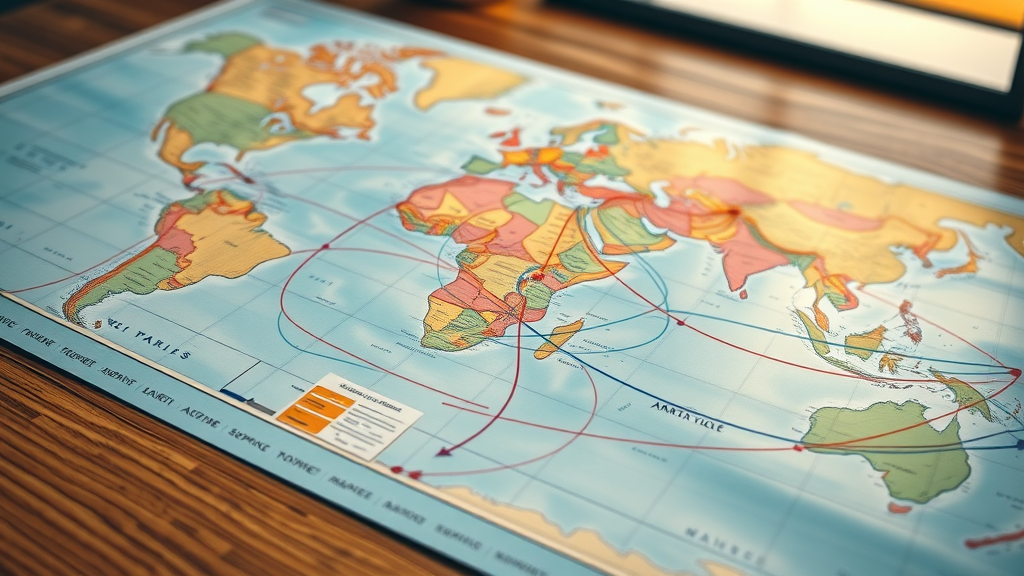"Global trade not only drives economic growth but also brings a mosaic of cultures and innovations to our doorstep."

Engaging in Global Trade: A Captivating Inquiry
Have you ever pondered how global trade shapes the world economy, impacting lives and businesses across the globe? In our interconnected era, engaging in international trade is akin to participating in a never-ending, intricate dance, where every move sparks new opportunities and challenges. As goods and services cross borders, they facilitate not just exchanges of commodities but also of ideas, culture, and technology. The main keyword global trade echoes through every sector, signifying its pervasive influence. This article is a journey into understanding how trade traverses beyond economic confines, weaving intricate patterns that define the lanes of the world market.
Understanding the Essence of Global Trade
"The flow of goods across borders is more than just trade; it's a dialogue between nations."
The essence of global trade is its ability to transform nations into interconnected hubs of economic activity, thereby shaping the global economy in profound ways. This intricate exchange is far from mere transactions; it's an ongoing conversation that fosters cooperation and rivalry alike. A thorough comprehension of these dynamics reveals why engaging in international markets is a pivotal strategy for economic resilience and growth. For insights into how trade policies are evolving, consider exploring Jamieson Greer’s Trade Policy Agenda.
Reflecting on Historical Significance: Why Global Trade Has Always Mattered
From the days of ancient trade routes like the Silk Road to modern-day digital swaps, international trade has always served as a backbone of civilizations. Historically, trade has facilitated the exchange of natural resources, like spices and silk, enriching cultures aesthetically and technologically worldwide. This aromatic and luxurious blend of history reiterates the longstanding importance of trade, setting the foundation for the elaborate global systems we navigate today.

The Mechanisms and Benefits of Global Trade Today
Decoding Global Trade: Definition and Key Insights
Global trade refers to the exchange of goods, services, and raw materials across international borders, governed by trade agreements and regulatory frameworks. This dynamic mechanism, supported by institutions like the World Trade Organization, ensures a structured environment where international commerce can thrive. The advantage of global trade helps nations leverage resources efficiently, bolstering economies worldwide. For a deeper understanding of economic growth prospects, check out Economic Growth Insights for Importers & Exporters in 2025.
Why Was Global Trade Important in Shaping Today's World?
The trade channels of yesteryears sculpted the prosperous and intricate trade networks that influence the world economy today. By enabling the seamless flow of trade data and commodities, international trade paves pathways that facilitate economic development and geopolitical stability. Understanding these developments is crucial for navigating today's business environment.

Examples of Global Trade Products Across Industries
The exchange of goods extends from simple consumer goods like electronics and clothing to complex machinery and technology, reflecting diverse global demand. Each industry leverages international trade to access markets worldwide, increase competitiveness, and harness global innovations.
How Global Trade Benefits Us: A Closer Look
From enhancing consumer choices to boosting economic growth, the benefits of global trade are multifaceted. It promotes economic collaboration by diversifying sources, reducing costs, and fostering innovation. By breaking down barriers, trade creates a tapestry of opportunities that benefit societies at a global scale.
| Benefit | Challenge |
|---|---|
| Increased Market Access | Trade Barriers |
| Enhanced Resource Efficiency | Environmental Concerns |
| Innovation and Research | Technological Disparities |

Challenges Facing Global Trade in the Modern Era
Addressing Trade Barriers and Tariffs
Despite its benefits, global trade faces significant challenges, notably tariffs and trade controls. These barriers can disrupt trade flows, leading to increased costs and reduced market access. Strategies to manage these issues often involve diplomatic negotiations and policy reforms aimed at fostering freer trade environments. For more on how tariffs impact trade, see Lower Tariffs on Mexico and Canada: Implications for Import-Export.
Environmental Impacts and Sustainable Practices
The environmental footprint of global trade cannot be overlooked. The transportation and production of goods contribute to ecological degradation, necessitating the integration of sustainable trade practices. Innovations in logistics and supply chain management are pivotal in reducing the ecological impact, highlighting the ever-growing need for sustainable solutions.
The Role of Technology in Overcoming Trade Challenges
Technology plays a transformative role in modernizing trade operations and addressing challenges. Advanced digital networks and data analytics enhance supply chain efficiency, facilitating smoother trade transactions and minimizing traditional barriers. By leveraging technological advancements, traders can optimize operations and navigate complexities effectively.

Opportunities for Growth in Global Trade
Emerging Markets and Investment Opportunities
"By exploring new markets, we plant the seeds for global prosperity."
The shift towards emerging markets presents lucrative opportunities for traders willing to tap into these vibrant economies. As regions like Asia and Africa evolve economically, they become attractive grounds for trade investment ventures, unlocking new pathways for global growth and collaboration.
The Role of Innovation and Technological Advancements
The rapidly evolving landscape of global trade is continually reshaped by technological innovations. AI and smart technologies revolutionize trade processes, enhancing precision and scalability. Embracing these advancements amplifies trade efficiency, ensuring robust growth trajectories for future market players.

Case Studies and Real-World Examples
Notable Global Trade Relationships and Agreements
Partnerships like the North American Free Trade Agreement (NAFTA) and the European Union have laid groundwork for successful international trade agreements. These collaborations underscore the significance of strategic alliances in promoting smoother trade flows and minimizing geopolitical tensions.
Success Stories: Companies Thriving in International Markets
Success stories abound with companies like Alibaba and Amazon, which outpace competitors by leveraging international trade avenues. Their strategies embody innovative approaches to capturing global markets and maintaining competitive edges amidst evolving trade landscapes.
What You'll Learn from This Exploration

- Understanding global trade dynamics
- Historical significance and current relevance
- Identifying challenges and opportunities
Key Takeaways: Insights into Global Trade

- Benefits and challenges overview
- Strategies for leveraging trade opportunities
FAQs on Global Trade
"The best way to navigate the complexities of global trade is through knowledge and strategic action."
What is the Meaning of Global Trade?
Global trade involves the exchange of goods and services across international boundaries, facilitated by strategic agreements and regulatory measures. It's essential for economic development and bridging markets worldwide.
Why Was Global Trade Important Historically?
Historical trade created alliances and increased wealth by exchanging goods and services. These activities laid the economic foundations that many modern economies are built upon today.

What are Examples of Global Trade Products?
Products range from simple agricultural produce to advanced electronics and automobiles. Industries worldwide rely on traded goods to meet consumer demands and expand market reach.
How Does Global Trade Benefit Us Today?
"In the world of trade, yesterday's mistakes pave the path to tomorrow's achievements."
Trade benefits societies through improved product availability, reduced costs, and increased competitive edge for businesses. Additionally, it fosters innovation by facilitating knowledge exchange across borders.
Conclusion: Embracing the Future of Global Trade
"Global trade holds the keys to a shared future of prosperity and progress for all."

Unlocking the potential of global trade lies in embracing change, innovation, and cooperation. Let us stride forward, harnessing opportunities that pave the way to a prosperous future.
 Add Row
Add Row  Add
Add 




Write A Comment